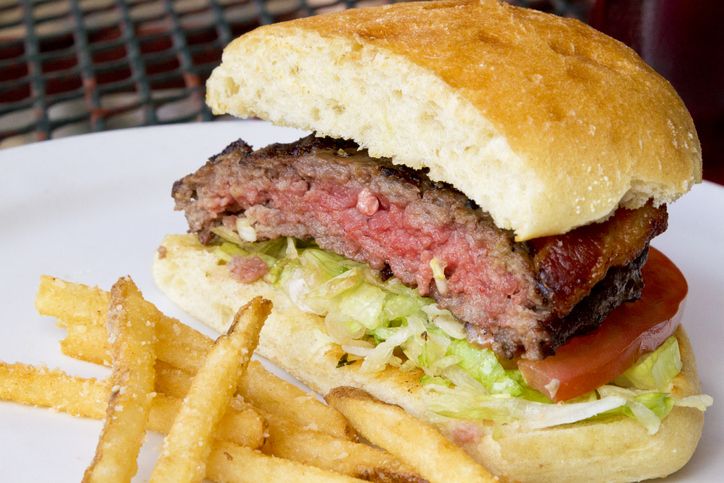Last month, AFN reported that Impossible Foods had sued Motif FoodWorks in a US federal court for alleged infringement of one of its patents relating to the use of heme in plant-based meat replacement products.
Now, Motif has struck back with legal action of its own – petitioning the US Patent & Trademark Office (USPTO) to revoke the patent at the center of the dispute.
On background:
- According to Impossible Foods, heme — a naturally occurring compound found in animal blood, among other places — “gives meat its bloody taste when raw and creates [its] intense, meaty flavors and aromas when it’s cooked.”
- The Bay Area-based company claims to have invented a way to produce a plant-based heme, soy leghemoglobin, using genetically modified yeast and fermentation techniques.
- In March, Impossible filed suit in the US District of Delaware, claiming that Motif’s Hemami ingredient — which also contains animal-free heme produced via fermentation — infringes on one of its US-issued patents which relates to “improved methods and compositions which more accurately replicate the characteristics that consumers value in the preparation and consumption of meat.”
- In the lawsuit, Impossible argues that Hemami used by Motif and its external partners, as well as their products containing the ingredient, are infringing on its intellectual property rights. It has asked the Delaware court for an injunction to stop their sale in the US, as well as monetary damages.
- It’s one of the first high-profile intellectual property clashes in the alt-protein space. Another involves California’s The Better Meat Co and Colorado-based Meati Foods, which have been locked in a dispute over technology relating to mycelial fermentation since last year.
What’s happened now:
Motif yesterday filed a petition with the USPTO for an inter partes review (IPR) of the Impossible patent in question.
- IPRs are a common countermeasure available to defendants in US patent litigation. They are a review procedure enabling parties to challenge the validity of patents; in other words, whether a patent actually meets patentability criteria, and therefore if it should ever have been issued to the holder — in this case, Impossible Foods — in the first place.
- Key criteria for the validity of a patent include the novelty and non-obviousness of the invention that it covers. However, these criteria cannot be met if there is ‘prior art’ – evidence that the solution described in the patent, or aspects of it, already existed in the public domain before the act of invention is claimed to have taken place.
- In its petition, Motif argues that there is a substantial body of prior art — including previously-issued patents and other literature — rendering Impossible’s patent invalid.
- Motif’s argument hinges on the idea that many of the technical solutions in the patent that Impossible claims to have invented have in fact been common knowledge for some time.
- Its petition argues that “non-meat ingredients that replicate meat date back centuries,” that such products “routinely incorporated soy protein in plant-based meat analogs,” and that “meat characteristics such as color, appearance, nutritional content, texture, taste, and smell have been engineered into meat replicas for decades.”
What happens next:
The USPTO’s Patent Trial & Appeal Board (PTAB) will decide either to institute Motif’s decision and commence the IPR process, or dismiss it.
- Before the PTAB makes this decision, Impossible can file a preliminary response to the petition.
- If the IPR is instituted, the PTAB will make a final determination on the patent’s validity within 12 to 18 months.
- If the PTAB determines that Impossible’s patent is totally valid, it may strengthen the company’s case in court.
- However, if the PTAB decides that Impossible’s patent is totally invalid, then the company will no longer be able to claim exclusive rights over the invention as described in the patent, and the original court litigation will effectively be ended. This could prove catastrophic for Impossible’s business given the importance it places on its heme solution.
- The PTAB may also find the patent partially invalid; in such circumstances, the litigation may continue.
What they say:
In a statement sent to AFN, a Motif FoodWorks spokesperson said that Impossible’s original lawsuit is a “legally and factually baseless attempt to stifle innovation and limit consumer choice to preserve [Impossible’s] profits.”
“We are confident the [PTAB] will agree with our view that the patent never should have been issued and revoke it,” they added.
“Our industry should work together to grow the plant-based category for the greater good – to benefit people and the planet. Competition is healthy. And it should play out in the marketplace, not the courts.”
An Impossible Foods spokesperson told AFN that Motif’s petition is a “baseless and meritless attempt to distract from the fact that they have infringed on our patent and are unlawfully using our technology to build their business,” describing the action as a “stunt.”
“We’re confident in the strength of our patent and that we will prevail both in the district court and before the patent office,” they added.





